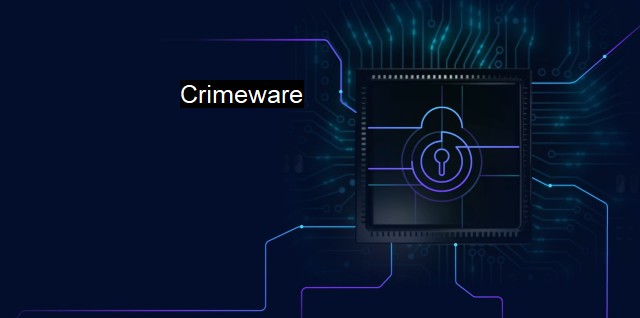What is Crimeware?
Crimeware: The Hidden Threat Lurking in your network infrastructure in Today's Digital Era
Crimeware is a class of malware designed not to cause damage to a computer system but to enable illegal activity. These harmful programs aim to facilitate crimes like identity theft, cyber espionage, phishing, ransomware, or distributed denial-of-service (DDoS) attacks through various means. While malware generally refers to software with malicious intent, crimeware specifically refers to malware used for a financial or data stealing motive.Crimeware represents one of the most significant threats in the domain of cybersecurity. Its existence throws light on a burgeoning issue where perpetrators are moving away from mere computer vandalism and instead focusing on financial and data-thieving crimes. The perpetrators are often part of criminal syndicates, and the professionalisation of crime has brought about a significant increase in method sophistication, software efficacy, and criminal monetary gain.
Crimeware comes in different forms. An example is software that captures keystrokes on a victim’s keyboard to steal his personal information such as usernames, passwords, and credit card numbers. Alternatively, crimeware could distribute phishing emails that trick people into revealing sensitive data, or provide a digital lock, as in the case of ransomware, until a ransom is paid to the attacker.
To make matters worse, crimeware is typically a package of multiple threats rather than just one, making it exponentially more harmful than traditional malware. It's an advanced tool in a hacker's repertoire, using various components like botnets, social engineering techniques, and exploit kits, to breach system security and exploit it to the attacker’s advantage.
Compounding this damaging cybersecurity threat is the rise of 'Crimeware as a Service’ (CaaS). A trend now common among cybercriminals, it involves the sale or lease of crimeware tool-kits on the dark web, which means that technically unsophisticated criminals can now carry out high-level cybercrimes. This has significantly broadened the scale and reach of potential cyber-attacks.
Defending against crimeware requires robust, comprehensive cybersecurity measures, such as a good-quality antivirus software. Antivirus software is an essential tool. It can identify, block, and eliminate a wide range of threats, including crimeware. More robust solutions include real-time protection against all types of malware, not just viruses, catching threats before they can take hold.
Security experts also recommend a strong firewall to block malicious traffic, the avoidance of suspicious sites and unverified downloads, regular software and system updates, and caution on clicking links in email and messaging apps - all critical ways to protect against crimeware.
Since the goal of most crimeware is financial gain, protecting financial and personal information online is critical. Garbling your data using encryption, secure browsing habits, enabling two-factor authentication, regular password changes/management, and backing up important data are notable defenses against cybercrimes.
Education is also an instrument of utmost importance. Understanding how criminals operate, what to look for, and how to avoid jeopardizing that security is the first line of defense against crimeware. Security aware users think before they click, understand the risks they face, and are more diligent about protecting their information.
Crimeware represents a significant theme of the modern cyber threat landscape. Hence, maintaining the basics of cybersecurity hygiene, constantly updating one's knowledge, utilizing sound security technology and practices, and investing in a robust threat detection system like antivirus software has never been more critical in fending off crimeware and protecting valuable digital assets. Although crimeware continues to evolve, so does our capacity to prevent and counter it.

Crimeware FAQs
What is crimeware?
Crimeware is a type of malware that is specifically designed to conduct criminal activities. It is often used to steal personal and financial information, such as login credentials, credit card numbers, and other sensitive data.How does crimeware work?
Crimeware typically works by exploiting vulnerabilities in computer systems to gain access to sensitive information. It can be spread through phishing scams, infected email attachments, or malicious downloads. Once installed, it can monitor user activity, steal data, and even take control of the infected system.How can I protect my computer from crimeware?
To protect your computer from crimeware, it is important to use antivirus software and keep it up-to-date with the latest security patches. You should also avoid clicking on suspicious email attachments or downloading software from untrustworthy sources. Finally, it is important to use strong passwords and enable two-factor authentication whenever possible.What should I do if my computer is infected with crimeware?
If you suspect that your computer has been infected with crimeware, you should immediately disconnect it from the internet to prevent further damage. You should then run a full scan with your antivirus software and follow its instructions to remove any infections. If you have reason to believe that your personal information has been stolen, you should also contact your financial institutions and monitor your accounts for unauthorized activity.| | A | | | B | | | C | | | D | | | E | | | F | | | G | | | H | | | I | | | J | | | K | | | L | | | M | |
| | N | | | O | | | P | | | Q | | | R | | | S | | | T | | | U | | | V | | | W | | | X | | | Y | | | Z | |
| | 1 | | | 2 | | | 3 | | | 4 | | | 7 | | | 8 | | |||||||